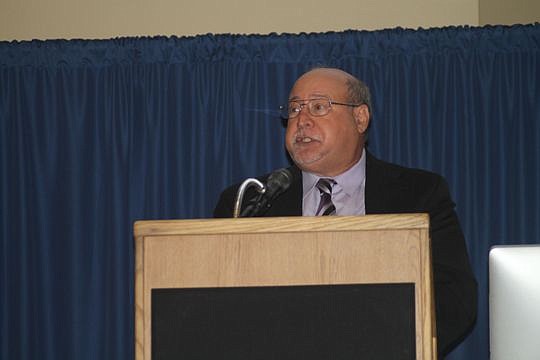
Paul Mason couldn’t find a single dark cloud hanging over Jacksonville’s economy, and it’s in his nature to try.
“My wife says my glass is half empty and draining through a small leak,” said Mason, an economics professor at the University of North Florida. “My kids for Father’s Day a couple of years ago gave me a statue of Eeyore.”
But in Jacksonville, retail sales are up and inflation is low. Jobs grew and unemployment fell.
“I’m actually upbeat and positive about what’s going to happen in the next few years,”he said.
It was happy news, too, for real estate professionals attending Coldwell Banker Commercial Benchmark’s first Real Estate Trends Conference, where Mason spoke.
That’s because a healthy economy precedes brisk real estate sales.
Rick Ray of The PARC group, developer of Nocatee, recalled the dark days of 2010. His company had just put $120 million in the ground for community infrastructure. It sold only 100 homes that year.
Today, Nocatee is the third fastest-selling master-planned community in the nation, on track to sell more than 1,000 homes this year.
By June, The PARC Group realized it was facing an inventory shortage.
For 2015 and 2016, Ray predicted residential real estate would continue to be strong, because new household formation is still below historic levels.
The news on the commercial side was upbeat, too.
Vacancy rates are down, said experts from CBC Benchmark. Rents are rising.
“Northeast Florida is the last to have the lights turned on. Miami, Tampa, they all beat us to the punch,” said CBC’s John Richwine. “But fortunately the lights are beginning to energize.”
The market outside Jacksonville is taking notice.
Three of Jacksonville’s four Downtown towers — Wells Fargo, Bank of America and
EverBank Center — sold to outside investors this year,
said Glenn Palmer of CBC Benchmark.
“That speaks well as to how the outside part of the country is looking to our market,” he said.
Fred Schmidt, chief operating officer of Coldwell Banker Commercial Affiliates, talked about national trends that would trickle down to Jacksonville:
• Energy self-sufficiency created by U.S. reserves of natural gas will be a driver across the entire economy. The most visible effect is lower gas prices. “That goes directly to disposable income” Schmidt said. “By contrast, when oil goes up to $125-$150 dollars per barrel, that’s where disposable income virtually stops. It’s almost as important as interest rates.”
• Millenials, at 76 million strong, will create economic shifts that baby boomers, at 74 million, did in their day. “Where you live work and play — this generation will dictate that,” Schmidt said. “So, paying attention to this group is extremely important in terms of your planning for real estate.”
• Retail is experiencing the largest systemic shift in commercial real estate. E-commerce now accounts for 5.8 percent of sales. On the other hand, Amazon just announced last week that they will open a retail store in Manhattan. “This is real battle of the supply chain,” Schmidt said.
(904) 356-2466
The forecast is bright for Jacksonville. The most recent year-over-year numbers show improvement in key areas of the economy.
Source: Paul Mason, UNF economics professor